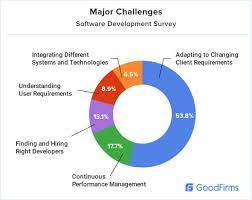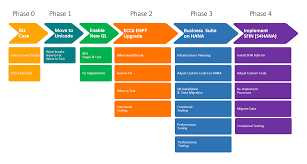The Ever-Evolving Landscape of the Software Development Industry
The Software Development Industry: A Comprehensive Overview
The software development industry plays a vital role in shaping the modern world. From mobile applications to enterprise systems, software developers are the architects behind the digital revolution.
Evolution of Software Development
Software development has come a long way since its inception. What started as simple programs has now evolved into sophisticated applications that power businesses and drive innovation across industries.
Trends and Technologies
The software development industry is constantly evolving, with new trends and technologies emerging at a rapid pace. From artificial intelligence and machine learning to blockchain and cloud computing, developers are always exploring new frontiers to create cutting-edge solutions.
Challenges Faced by Developers
Despite the exciting opportunities in the software development industry, developers also face challenges. Tight deadlines, changing requirements, and technical debt are just a few of the hurdles that developers must navigate to deliver high-quality software products.
The Future of Software Development
Looking ahead, the future of software development is promising. With advancements in automation, DevOps practices, and agile methodologies, developers are poised to streamline their workflows and deliver value to clients more efficiently than ever before.
Conclusion
The software development industry is a dynamic and ever-changing field that continues to shape our digital landscape. As technology continues to advance, developers will play a crucial role in driving innovation and transforming the way we interact with technology.
8 Reasons to Pursue a Career in Software Development: Opportunities, Growth, and Innovation
- High demand for skilled professionals
- Opportunities for creativity and innovation
- Potential for high salaries and career growth
- Diverse range of job roles and specializations
- Ability to work remotely or freelance
- Continuous learning and skill development
- Contribution to shaping the future of technology
- Collaborative work environment with like-minded individuals
Challenges in the Software Development Industry: Managing Stress, Scope Creep, Technical Debt, Competition, and Continuous Learning
- Tight deadlines often lead to increased stress and burnout among developers.
- Changing requirements can result in scope creep, leading to project delays and budget overruns.
- Technical debt accumulates over time, making it challenging to maintain and update existing software systems.
- High levels of competition in the industry can make it difficult for individual developers or small firms to stand out.
- Keeping up with rapidly evolving technologies requires continuous learning and professional development, which can be time-consuming.
High demand for skilled professionals
The software development industry boasts a high demand for skilled professionals, making it a lucrative field for those with the right expertise. As technology continues to advance and businesses rely more on digital solutions, the need for talented software developers only continues to grow. This demand not only offers ample job opportunities but also provides developers with the chance to work on diverse projects and stay at the forefront of innovation in the ever-evolving tech landscape.
Opportunities for creativity and innovation
The software development industry offers abundant opportunities for creativity and innovation, allowing developers to push the boundaries of technology and bring imaginative ideas to life. From designing user-friendly interfaces to developing cutting-edge algorithms, software developers have the freedom to explore new solutions and create innovative products that can revolutionize how we interact with technology. This creative freedom not only fuels individual growth but also drives industry-wide advancements, leading to groundbreaking developments that shape the future of digital innovation.
Potential for high salaries and career growth
In the software development industry, professionals have the potential for high salaries and significant career growth opportunities. As technology continues to advance and businesses increasingly rely on software solutions, skilled developers are in high demand. With specialized skills and experience, software developers can command competitive salaries and access a wide range of career paths, from senior developer roles to project management positions. Continuous learning and staying updated with the latest technologies can further enhance one’s earning potential and open doors to exciting career advancements in this dynamic industry.
Diverse range of job roles and specializations
The software development industry offers a diverse range of job roles and specializations, providing professionals with ample opportunities to pursue careers tailored to their interests and skills. From software engineers and web developers to data scientists and cybersecurity experts, individuals can choose from a wide array of roles that cater to various aspects of software development. This diversity not only allows for personal growth and specialization but also fosters collaboration and innovation within the industry as different experts come together to create cutting-edge solutions.
Ability to work remotely or freelance
The software development industry offers the unique advantage of allowing professionals to work remotely or freelance. This flexibility enables developers to take on projects from anywhere in the world, providing a greater work-life balance and the freedom to choose their own schedules. Remote work and freelancing opportunities in software development also promote diversity and inclusion by breaking down geographical barriers and opening up access to a global talent pool. Developers can collaborate with teams across different time zones, fostering creativity and innovation in a dynamic virtual environment.
Continuous learning and skill development
Continuous learning and skill development are inherent pros of the software development industry. In this fast-paced field, technology evolves rapidly, driving developers to constantly update their knowledge and expertise. By staying abreast of the latest tools, languages, and frameworks, software developers enhance their problem-solving abilities and adapt to industry trends. This commitment to ongoing learning not only ensures that developers remain competitive in the market but also fosters a culture of innovation and excellence within the industry.
Contribution to shaping the future of technology
The software development industry plays a crucial role in shaping the future of technology by driving innovation and pushing the boundaries of what is possible. Through the creation of cutting-edge applications, platforms, and systems, software developers pave the way for technological advancements that impact every aspect of our lives. By continuously exploring new ideas and embracing emerging technologies, the industry not only adapts to change but also drives it, ensuring that we are always at the forefront of innovation and progress.
Collaborative work environment with like-minded individuals
The software development industry offers a unique pro of fostering a collaborative work environment with like-minded individuals. Developers have the opportunity to work alongside peers who share their passion for technology and innovation. This shared enthusiasm creates a supportive atmosphere where ideas are freely exchanged, knowledge is shared, and teamwork thrives. Collaboration in the software development industry not only enhances creativity and problem-solving but also cultivates a sense of camaraderie among professionals working towards common goals.
Tight deadlines often lead to increased stress and burnout among developers.
Tight deadlines in the software development industry can have detrimental effects on developers, often resulting in heightened stress levels and increased risk of burnout. The pressure to deliver projects within constrained timeframes can lead to long working hours, compromised work-life balance, and decreased job satisfaction. As developers strive to meet unrealistic deadlines, their mental and physical well-being may suffer, impacting their productivity and creativity. It is essential for organizations to prioritize realistic timelines and support their developers’ well-being to prevent burnout and promote a sustainable work environment in the software development industry.
Changing requirements can result in scope creep, leading to project delays and budget overruns.
In the software development industry, one significant con is the challenge posed by changing requirements that can result in scope creep. When project requirements evolve or expand beyond the initial scope, developers may face difficulties in managing these changes effectively. Scope creep can lead to project delays as developers scramble to accommodate new features or functionalities, ultimately impacting timelines and causing budget overruns. This issue underscores the importance of effective project management and clear communication between stakeholders to mitigate the risks associated with changing requirements during software development projects.
Technical debt accumulates over time, making it challenging to maintain and update existing software systems.
One significant drawback in the software development industry is the accumulation of technical debt over time. This phenomenon occurs when shortcuts or quick fixes are implemented during the development process, leading to suboptimal code quality and system architecture. As technical debt mounts, it becomes increasingly challenging for developers to maintain and update existing software systems efficiently. The presence of technical debt can hinder productivity, increase the risk of errors, and impede the scalability of software applications, ultimately posing a significant challenge for software development teams striving to deliver high-quality products within tight deadlines.
High levels of competition in the industry can make it difficult for individual developers or small firms to stand out.
In the software development industry, one significant challenge is the high levels of competition that can make it challenging for individual developers or small firms to differentiate themselves. With a crowded marketplace and numerous established companies vying for clients’ attention, standing out and gaining recognition can be an uphill battle. This intense competition often leads to pricing pressures, limited opportunities for growth, and difficulties in securing projects that align with the unique strengths of individual developers or small firms. As a result, navigating through this competitive landscape requires strategic positioning, innovation, and a strong focus on delivering exceptional value to clients to carve out a niche in the industry.
Keeping up with rapidly evolving technologies requires continuous learning and professional development, which can be time-consuming.
In the software development industry, one significant challenge is the need to keep pace with rapidly evolving technologies, which demands continuous learning and professional development. This constant need for upskilling and staying current with the latest trends can be time-consuming for developers. Balancing project deadlines and client expectations with investing time in learning new technologies poses a conundrum for professionals in this field, as they strive to maintain their expertise while delivering high-quality software solutions.












